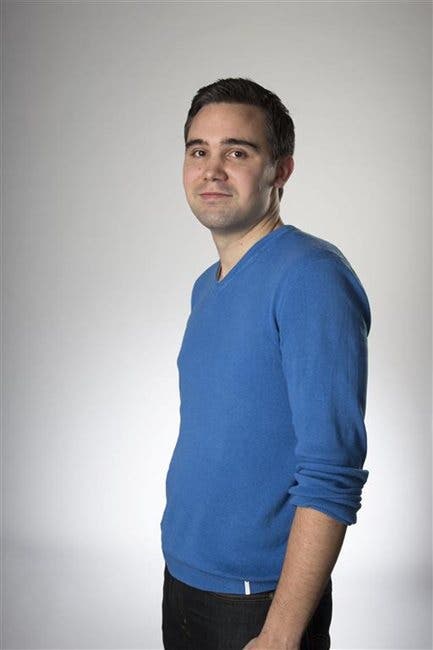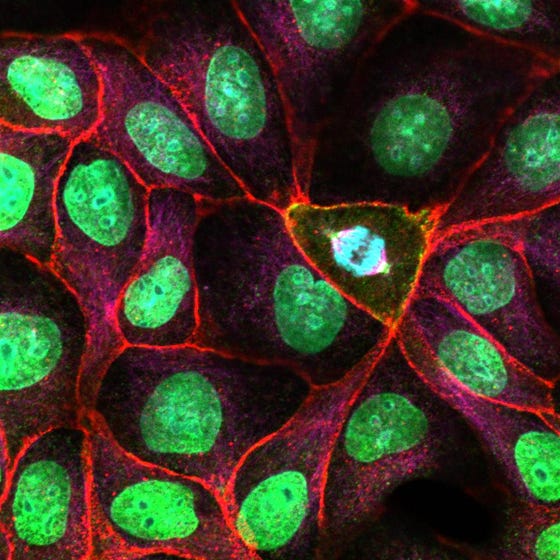Group Gloerich
Dr. Martijn Gloerich, Associate Professor
Telephone number
+31 (0)88 75 68744
E-mail address
M.Gloerich@umcutrecht.nl

Areas of expertise uitklapper, klik om te openen
Dr. Martijn Gloerich is group leader at the department of Molecular Cancer Research within the Center of Molecular Medicine at the UMC Utrecht.
Martijn obtained his PhD (cum laude) in 2011 from Utrecht University for his work on the regulation of small GTPases. Using molecular cell biology and live-cell imaging approaches he studied how intracellular signaling by small GTPases establishes cell adhesion and cell polarity.
Following his PhD, Martijn became interested in understanding how the behavior of cells is controlled by instructive signals from the surrounding tissue. He received fellowships from NWO and KWF to perform postdoctoral research in the lab of James Nelson at Stanford University (USA). Here, he gained experience with numerous microfabrication and bio-engineering techniques, and established different reductionist approaches to study how communication between cells influences how and when cells divide.
In 2016 Martijn returned to the Netherlands to start his own research group at the UMC Utrecht. Supported by his accumulated expertise, Martijn’s group uses an interdisciplinary approach that includes microfabrication techniques, advanced live-cell imaging and molecular biochemistry to understand how cell division is regulated by instructive cues from neighboring cells. His group applies the gained molecular knowledge to different model systems to answer how extrinsic regulation of cell division controls tissue development and homeostasis, and how its disruption contributes to tumor development and progression.

Research program / group uitklapper, klik om te openen
The regulation of cellular behavior requires instructive cues from the local tissue environment. These cues include biochemical signals that act through activation of signaling and adhesion receptors. In addition, diverse mechanical cues are present in tissues, such as stiffness of the extracellular matrix and tissue tension, which are sensed by the cell and converted into a biochemical signal. Together, these cues trigger an intracellular response and ultimately decide on whether cells for instance proliferate, differentiate or migrate.
Uncontrolled cell division underlies the development of cancer. Most studies have focused on cell intrinsic mechanisms that control cell division and may be disrupted in cancer cells. Importantly, as local cues from the surrounding tissue instruct cells when to proliferate and eventually divide, loss of the underlying cell-cell communication will contribute to cancer development and progression as well. In addition, these cues provide spatial information that establishes the orientation of cell division, which determines the position of daughter cells in the tissue. Hereby, they may control tissue architecture and cell fate, and loss of correct division orientation has been linked to disruption of tissue organization and consequently tumor progression.
We are taking a reductionist approach to understand the contribution of individual extrinsic cues to the regulation of different aspects of cell division. We apply the gained molecular knowledge to different model systems, including intestinal organoids, to identify how these contribute to tissue development and homeostasis in health and disease.
Our current research revolves around the following questions:
- How do cues from the local tissue environment determine when cells divide?
- How do extracellular cues determine the orientation of cell division and how does this control tissue architecture and cell fate?
- How is tissue integrity maintained when cells go through mitosis?
Group members
- Willem-Jan Pannekoek - Post-doc, w.j.pannekoek@umcutrecht.nl
- Lisa Donker - PhD Student, l.donker@umcutrecht.nl
- Mirjam van der Net - PhD Student, m.c.vandernet-2@umcutrecht.nl
- Jooske Monster - PhD Student, j.l.monster@umcutrecht.nl
- Ronja Houtekamer - PhD Student, r.m.houtekamer@umcutrecht.nl
- Lars Kemp - PhD Student, l.j.s.kemp-2@umcutrecht.nl
- Marjolein Vliem - Technician, m.vliem@umcutrecht.nl
- Janneke Hummelink - Master student, j.a.hummelink@umcutrecht.nl
- Beau Neep - Master student, b.f.neep@umcutrecht.nl
- Anne Lankamp - Master student, a.a.lankamp-2@umcutrecht.nl
Key publications uitklapper, klik om te openen
- Decoding mechanical cues by molecular mechanotransduction Swaminathan V and Gloerich M.Current Opinion in Cell Biology, in press
- An asymmetric junctional mechanoresponse coordinates mitotic rounding with epithelial integrity.Monster JL, Donker L, Vliem MJ, Win Z, Matthews HK, Cheah JS, Yamada S, de Rooij J, Baum B, Gloerich M. J Cell Biol. 2021 May 3;220(5)
- Force transduction by cadherin adhesions in morphogenesis. Pannekoek WJ, de Rooij J, Gloerich M.F1000Res. 2019 Jul 10;8:F1000 Faculty Rev-1044.
- E-cadherin and LGN align epithelial cell divisions with tissue tension independently of cell shape.Hart KC, Tan J, Siemers KA, Sim JY, Pruitt BL, Nelson WJ, Gloerich M. Proc Natl Acad Sci U S A. 2017 Jul 18;114(29).
- Cell division orientation is coupled to cell-cell adhesion by the E-cadherin/LGN complex. Gloerich M, Bianchini JM, Siemers KA, Cohen DJ, Nelson WJ. Nat Commun. 2017 Jan 3;8:13996.
- Epithelial self-healing is recapitulated by a 3D biomimetic E-cadherin junction. Cohen DJ, Gloerich M, Nelson WJ. Proc Natl Acad Sci U S A. 2016 Dec 20;113(51):14698-703,
More contact information uitklapper, klik om te openen
Secretariat
Marianne van der Heiden
a.m.vanderheiden@umcutrecht.nl
+31 (0)88 75 68989
Visiting address
Stratenum, room 3.235
Universiteitsweg 100
3584 CG, The Netherlands
